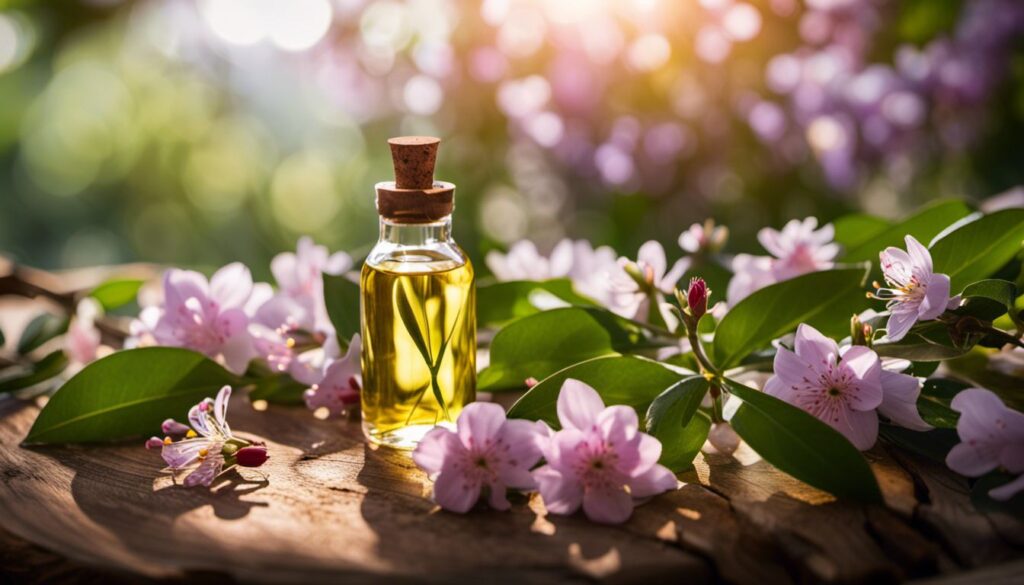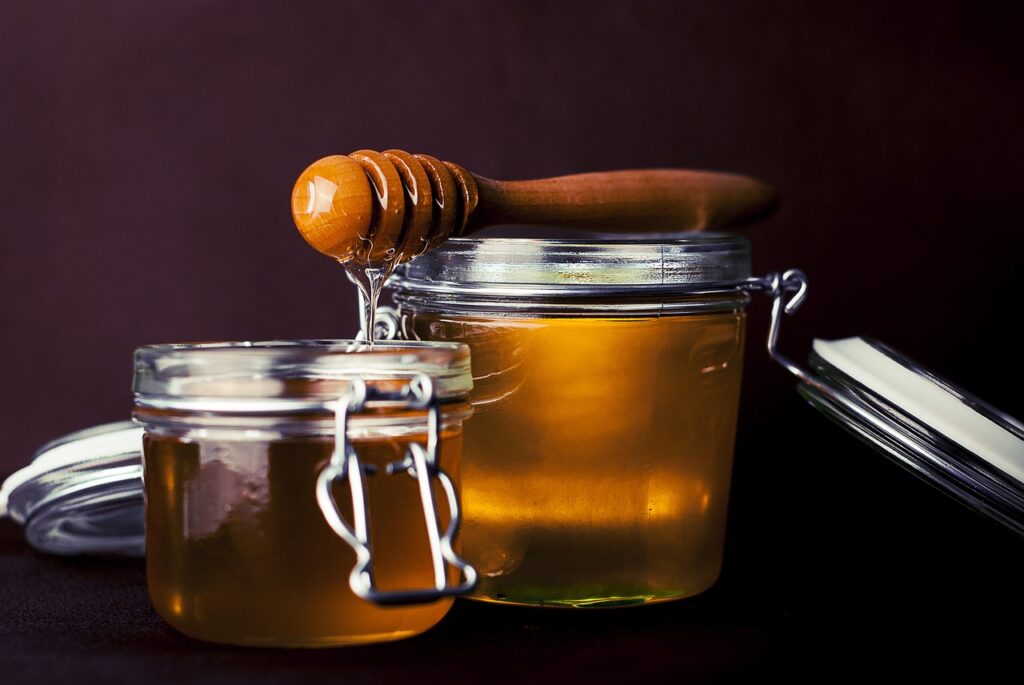Beyond Beauty: Exploring 10 Nourishing and Diverse Benefits of Jojoba Oil
Are you tired of dealing with finicky skin and unmanageable hair? Jojoba oil, a remarkable natural extract sourced from the jojoba plant native to North America, might be your saving grace.
- Understanding Jojoba Oil
- The Composition of Jojoba Oil
- Top 10 Benefits of Jojoba Oil: Acne, Eczema, Dry Skin, Hair Growth, and More
- 1.) Potential Acne Treatment
- 2.) Skin Moisturizing Properties
- 3.) Promotes Hair Growth
- 4.) Anti-Aging Effects
- 5.) Soothing Effects on Psoriasis and Eczema
- 6.) Makeup Removal
- 7.) Eyelash Thickening and Lip Balm Uses
- 8.) Potential Treatment for Fungal Infections
- 9.) Possible Relief for Cradle Cap
- 10.) Nail Care and Grooming Uses
- How Jojoba Oil Benefits Your Hair and Skin: Additional Uses
- Tips for Using Jojoba Oil
- Potential Risks and Side Effects of Jojoba Oil
- How to Choose Good Quality Jojoba Oil
- Conclusion
- FAQs
It promotes healthy skin and hair, and its benefits extend beyond beauty.
- The oil from jojoba seed is rich in vitamins and minerals that nourish and moisturize the skin.
- Its similarity to our skin’s natural oils allows it to penetrate deeply and provide long-lasting hydration.
- The gentle nature of this oil makes it suitable for most skin types, including oily and combination skin.
That’s not always the case with many skincare ingredients, even natural ones. Therefore, Jojoba oil is a solid choice for adding to things like face masks, as a carrier oil, or even to nourish the hair and scalp.
All in all, the versatility and effectiveness of jojoba oil make it a popular choice for those looking for natural and sustainable beauty solutions. Jojoba oil is worth considering whether you’re struggling with dry skin or frizzy, dry hair or simply want to enhance your overall well-being.
Let’s explore this nourishing powerhouse that could revolutionize your personal care routine!
Understanding Jojoba Oil
Contrary to common belief, Jojoba Oil isn’t actually an oil. Instead, it’s a liquid wax extracted from the nut of the North American Jojoba plant. Its unique composition is what sets this golden-colored fluid apart from other oils.
It’s rich in long-chain fatty acids and alcohol that mimic sebum, the natural skin oil our body produces. This similarity allows Jojoba Oil to blend seamlessly with our skin and hair for enhanced absorption. This enables jojoba oil to penetrate beyond just the top layer of the skin, reaching deeper layers for unparalleled nourishment.
Interestingly, the Native American O’odham people first discovered its utility as a nourishing agent for hair and skin health centuries ago. Today, scientific evidence upholds their traditional use, underscoring how Jojoba Oil benefits inflammatory conditions like acne or psoriasis due to its non-comedogenic and hypoallergenic properties.
Jojoba oil has also been found to be high in essential nutrients like vitamins E and B, along with minerals such as copper and zinc. That makes it ideal for individuals to add it to their skincare routines worldwide.
The Composition of Jojoba Oil

Jojoba oil originates from the seeds of the jojoba shrub, mainly found in southern Arizona, California, and Mexico’s northwest regions. The process involves pressing these seeds to extract their valuable liquid wax.
This unique substance closely resembles human sebum, an oil our skin naturally produces for protection and hydration. Jojoba oil contains a blend of beneficial fatty acids such as oleic, stearic, and palmitic acids.
Each plays a vital role in nourishing your skin without clogging pores or causing greasiness. Its non-comedogenic characteristic makes it a perfect choice for all skin types, including those with sensitive or acne-prone conditions, due to its anti-inflammatory properties.
In addition to skincare benefits, this powerful oil contributes significantly towards promoting hair growth while protecting against dryness and dandruff; it also possesses attributes that can help delay early signs of aging.
Top 10 Benefits of Jojoba Oil: Acne, Eczema, Dry Skin, Hair Growth, and More
Jojoba oil offers a plethora of benefits, including potential acne treatment, skin moisturizing properties, hair growth promotion, anti-aging effects, soothing effects on psoriasis, makeup removal capabilities, eyelash thickening, and lip balm uses, a potential treatment for fungal infections, relief for cradle cap, and nail care and grooming uses.
Discover how this versatile oil can enhance your beauty regimen with the following ten uses.
1.) Potential Acne Treatment
Jojoba oil holds great potential in treating acne due to its anti-inflammatory capabilities. The oil can reduce inflammation and soothe irritated skin. This helps to reduce the appearance of redness typically associated with breakouts.
It’s also non-comedogenic, making it suitable for all skin types without worrying about further clogged pores or increased sebum production that exacerbates acne problems. As we know, acne sufferers have skin that produces excess oil, so avoiding ingredients that increase oil production or clog pores is important. This characteristic allows jojoba oil to provide gentle care for even the most sensitive skin while effectively battling against acne-causing bacteria.
However, medical advice should be sought for severe acne conditions before opting for any topical treatments at home like jojoba oil application.
2.) Skin Moisturizing Properties
Jojoba oil is widely known for its exceptional skin moisturizing properties. Its composition includes fatty acids that help to keep the skin hydrated and supple. Unlike other oils, jojoba oil is non-comedogenic (comedogenic rating of 2/5), meaning it won’t clog pores or lead to breakouts.
This makes it suitable for all skin types, including those with sensitive or acne-prone skin. In addition to these uses, jojoba oil can also be used as a natural makeup remover, lip balm, or even as a carrier oil blend for massage. This oil’s natural moisturizing properties and ability to seal moisture in the skin will leave you feeling nourished and hydrated throughout the day.
3.) Promotes Hair Growth
Jojoba oil is not only beneficial for the skin but also promotes hair growth by moisturizing and soothing the scalp. It contains essential vitamins and minerals that nourish the scalp, making it a more healthy environment for hair growth.
Applying jojoba oil to your scalp regularly can treat issues like dryness and dandruff. Due to the nourishing effect this has on the scalp, especially if you use it as a carrier oil for something like peppermint or rosemary essential oils, each of which demonstrates positive results regarding hair growth.
If you’re looking for a natural remedy for nourishing the hair and scalp, jojoba oil is a solid choice.
4.) Anti-Aging Effects
Jojoba oil is a natural ingredient that offers impressive anti-aging effects. Its humectant properties help delay the signs of aging, such as fine lines and wrinkles. Jojoba oil keeps the skin hydrated and youthful-looking by retaining moisture without clogging pores.
The fatty acids found in jojoba oil nourish the skin, promoting its suppleness and reducing the appearance of wrinkles. As mentioned earlier, this versatile oil is non-comedogenic and suitable for all skin types, making it an excellent choice for anyone looking to effectively combat the signs of aging.
As our skin ages, it becomes more susceptible to environmental factors. That’s where gentle moisturizers like jojoba can be especially useful.
The benefits of jojoba oil extend beyond hydration. It can also be used as a gentle makeup remover that keeps the skin nourished and prevents dryness and wrinkles. Whether you’re concerned about fine lines or want to maintain your youthful glow, incorporating jojoba oil into your skincare routine can significantly reduce the visible signs of aging.
5.) Soothing Effects on Psoriasis and Eczema
Jojoba oil has been found to have soothing effects on psoriasis, a chronic inflammatory skin condition. It can help alleviate the symptoms of psoriasis by reducing inflammation and redness associated with the condition. It has similar benefits for eczema, another inflammatory skin disease.
The anti-inflammatory properties of jojoba oil may also relieve itching and flaking caused by psoriasis. Furthermore, jojoba oil is a natural moisturizer that can help prevent dryness and nourish the skin.
These characteristics make it suitable for sensitive and irritated skin often experienced by individuals with psoriasis and other common skin diseases. Overall, incorporating jojoba oil into your skincare routine may provide much-needed relief for those suffering from psoriasis-related discomfort, as well as skin sensitivities related to other skin diseases.
6.) Makeup Removal
Jojoba oil is not only beneficial for nourishing the skin, but it also serves as an effective makeup remover. This natural oil can gently and effortlessly eliminate all types of makeup, including stubborn waterproof mascara.
It’s a safe alternative to chemical-based removers and won’t cause any irritation or clog pores. While removing your makeup, jojoba oil simultaneously moisturizes and nourishes the skin, leaving it feeling soft and hydrated.
So you can enjoy clean, fresh skin without compromising its health and vitality.
7.) Eyelash Thickening and Lip Balm Uses
Jojoba oil is not only beneficial for your skin and hair, but it can also be used to thicken your eyelashes. Its moisturizing properties help nourish the lashes, making them appear fuller and healthier.
Additionally, jojoba oil can also double as a lip balm. Its hydrating effects help keep your lips soft and smooth, providing much-needed moisture. So, instead of investing in separate products for thicker lashes and hydrated lips, use jojoba oil as a versatile solution.
8.) Potential Treatment for Fungal Infections
Jojoba oil has been found to have potential as a treatment for fungal infections. Scientific studies have shown that jojoba oil exhibits antifungal properties, meaning it may be effective against nail or foot fungus.
This natural oil can help combat the growth of fungi and inhibit their spread, relieving these pesky infections. If you’re dealing with fungal issues, consider trying jojoba oil as a possible treatment option. As always, check with your healthcare provider first.
9.) Possible Relief for Cradle Cap
Jojoba oil has shown the potential to provide relief for cradle cap, a common condition that affects infants. Cradle cap is characterized by scaly patches on the baby’s scalp, which can be itchy and uncomfortable.
Applying jojoba oil to the affected areas helps moisturize the skin and soften the scales, making it easier for them to gently be removed over time. The nourishing properties of jojoba oil can help soothe and hydrate the scalp, promoting healing and reducing inflammation.
This natural remedy offers a gentle solution for parents looking to alleviate their baby’s cradle cap symptoms without resorting to harsh chemicals or medications.
10.) Nail Care and Grooming Uses
Jojoba oil is not just beneficial for your skin and hair, but it can also be used to take care of your nails.
Using jojoba oil on your nails regularly can contribute to their overall health and beauty. Whether you want to strengthen brittle nails, moisturize dry cuticles, or simply promote healthy growth, incorporating jojoba oil into your nail care routine can provide nourishment and protection.
So why not give your nails some extra love by adding this versatile oil to your grooming regimen?
How Jojoba Oil Benefits Your Hair and Skin: Additional Uses

Jojoba oil benefits your hair and skin by providing essential vitamins and minerals, improving acne-prone skin, reducing fine lines, relieving sunburn, and strengthening hair.
Rich in Vitamins and Minerals
Jojoba oil is a powerhouse of vitamins and minerals, making it an excellent addition to your skincare routine. It contains essential nutrients such as vitamin E, which helps nourish and protect the skin from oxidative damage caused by environmental factors like UV exposure.
Additionally, jojoba oil is rich in important minerals like zinc and copper, which play a crucial role in promoting healthy skin function. These vitamins and minerals work together to support overall skin health, leaving you with a radiant complexion that looks and feels great.
Not only does jojoba oil provide these vital nutrients to the skin, but it also has humectant properties that help lock in moisture. This makes it an effective moisturizer for all skin types, including dry or sensitive skin.
Suitable for Acne-Prone Skin
Jojoba oil is an excellent choice for those with acne-prone skin. It has a non-comedogenic profile, meaning it won’t clog your pores and potentially worsen acne breakouts. Additionally, jojoba oil has anti-inflammatory properties that can help soothe inflamed and irritated skin commonly associated with acne. The anti-acne effects of jojoba oil, as well as many other benefits, are detailed in Pubmed’s Updated Comprehensive Review on Chemistry, Pharmaceutical Uses, and Toxicity.
This versatile oil keeps your skin hydrated without leaving a greasy residue, making it particularly beneficial for individuals struggling with oily or combination skin types. Say goodbye to conventional moisturizers that can aggravate acne, and hello to the nourishing benefits of jojoba oil.
Potential Improvement of Fine Lines
Jojoba oil has the potential to improve fine lines and wrinkles on the skin. This is due to its humectant properties, which help to retain moisture and promote hydration in the skin cells.
Jojoba oil can help reduce the appearance of fine lines and prevent new ones from forming by keeping the skin well-hydrated. Scientific studies have also shown that jojoba oil can act as a soft colloidal nanocarrier for skincare treatments, suggesting its ability to deliver ingredients that target fine lines and wrinkles effectively.
If you’re looking for a natural way to combat signs of aging, incorporating jojoba oil into your skincare routine may be worth considering.
Sunburn Relief
Jojoba oil is a powerful remedy for sunburn relief. Its anti-inflammatory properties can soothe and calm sun-damaged skin, providing immediate relief from pain and promoting healing.
By moisturizing and nourishing the affected areas, jojoba oil prevents peeling and dryness, leaving your skin hydrated and supple. Additionally, it helps to reduce redness and inflammation caused by sunburns, making it an effective natural remedy for soothing the discomfort of sunburned skin.
To experience its cooling effects, simply apply jojoba oil topically to the affected areas for much-needed relief.
Hair Conditioner and Strengthening
It acts as a natural conditioner, moisturizing the hair from root to tip, making it a wonderful treatment for dry hair. This helps to prevent dryness and split ends, resulting in stronger and more resilient strands. To use jojoba oil for hair strengthening, simply massage a few drops into your scalp and through your hair before washing or leave it on overnight as a deep conditioning treatment.
Tips for Using Jojoba Oil
Using jojoba oil correctly can help you maximize its benefits. Here are some tips to keep in mind:
- Apply a few drops of jojoba oil directly to your skin or hair and gently massage it in.
- Mix a few drops of jojoba oil with your favorite moisturizer, serum, or hair product for added hydration.
- Use jojoba oil as a makeup remover by applying it to a cotton pad and gently wipe away your makeup.
- For dry scalp or dandruff, massage oil into your scalp before shampooing.
- It can be used as a carrier oil for your favorite essential oils, homemade lotions, and massage oils.
- If you have sensitive skin, do a patch test before you apply the oil to a larger area and check for any allergic reactions.
- For best results, use pure, cold-pressed jojoba oil without any added ingredients or chemicals.
Potential Risks and Side Effects of Jojoba Oil
Jojoba oil is generally safe to use and has a low risk of side effects. However, it’s important to note that everyone’s skin reacts differently, so there are some potential risks to be aware of.
One possible side effect is an allergic reaction. Although rare, some people may experience itching, redness, or swelling after applying jojoba oil to their skin. Therefore, performing a patch test before incorporating jojoba oil into your skincare routine is essential to check for any potential adverse reactions.
This simple precaution can help identify sensitivity issues and ensure a safe experience with this natural oil. If any allergic reactions occur, it is advisable to discontinue use and consult a healthcare professional for further guidance.
Another risk is the possibility of clogged pores or breakouts. Jojoba oil has a comedogenic rating of 2 out of 5, which means it has a moderately low likelihood of clogging pores for most individuals. That said, everyone’s skin is different, and we all have varying degrees of sensitivity. Treat carefully and thoughtfully with any new addition to your skincare routine.
As with anything applied to the skin, it’s essential to use caution and only apply small amounts topically. Again, be sure to perform a patch test for extra caution. Patch tests are great for determining whether your skin may react negatively to new skincare products or ingredients.
Overall, while jojoba oil is generally safe for most people when used for skin care, hair care, and other uses we’ve discussed, it’s again always best to consult with a healthcare professional if you have any concerns or pre-existing conditions before incorporating it into your skincare routine.
How to Choose Good Quality Jojoba Oil
When selecting jojoba oil, it is important to choose a high-quality product to ensure maximum benefits for your skin and hair. Here are some tips to help you choose good quality jojoba oil:
- Look for organic or cold-pressed: Opt for jojoba oil that is organic or cold-pressed. This ensures that the oil has been processed without the use of chemicals or heat, preserving its natural goodness.
- Check for purity: Read the label carefully to ensure that the jojoba oil is 100% pure and contains no additives or synthetic ingredients.
- Consider the packaging: Good quality jojoba oil is usually packaged in dark glass bottles to protect it from sunlight and maintain its potency.
- Pay attention to the color and smell: Pure jojoba oil should have a golden yellow color and a mild, nutty scent. Avoid oils that are overly clear or have a strong odor, as these may be less pure.
- Research the brand: Choose reputable brands that have a track record of producing high-quality skincare products. Look for reviews and customer feedback to learn more about their manufacturing practices and product quality.
- Check certifications: Look for certifications such as USDA Organic or Ecocert to ensure that the jojoba oil meets specific standards of purity and sustainability.
- Consider your needs: Different grades of jojoba oil are available, ranging from cosmetic grade to food grade. Ensure that you choose an appropriate quality based on your intended use.
- Patch test before use: Before using jojoba oil on your skin or hair, perform a small patch test on a small area of your skin to check for any allergic reactions or sensitivities.
Conclusion
In conclusion, jojoba oil is a versatile and beneficial ingredient that goes beyond just beauty applications. Its unique composition and properties make it suitable for various skincare needs, from moisturizing the skin to treating acne and soothing inflammatory conditions like psoriasis.
Additionally, it can promote hair growth, strengthen nails, and even be used as a natural makeup remover. Incorporating jojoba oil into your skincare routine can provide you with nourished and healthy hair and skin.
Explore the diverse benefits of this incredible oil for yourself!
Key Takeaways
- Jojoba oil is a versatile natural extract that offers numerous benefits beyond beauty enhancements.
- Its unique composition, similar to sebum, allows it to seamlessly blend with the skin and hair for enhanced absorption.
- Jojoba oil has anti-inflammatory properties that make it an ideal choice for treating acne and soothing inflammatory conditions like psoriasis.
- It promotes hair growth, strengthens nails, and can be used as a gentle makeup remover.
FAQs
1. How can jojoba oil benefit my skin?
Jojoba oil is a natural moisturizer that can help hydrate and nourish the skin, making it softer and smoother. It is also known to have anti-inflammatory properties, which can be beneficial for soothing irritated or sensitive skin.
2. Can jojoba oil be used on hair as well?
Yes, jojoba oil can be used on hair to promote healthier strands. It helps moisturize dry and damaged hair, reduce frizz, and improve overall hair texture. Additionally, it can help balance the scalp’s natural oils and minimize dandruff.
3. What other benefits does jojoba oil offer?
In addition to its skincare and hair conditioning benefits, jojoba oil has various other uses. It can be used as a makeup remover, cuticle conditioner, lip balm ingredient, massage oil base (with a few drops of essential oil), and even as a natural remedy for certain skin conditions like acne or eczema. Lastly, there are some that support its use for hair loss, though there’s limited scientific evidence to support its true effectiveness.
4. Is jojoba oil suitable for all skin types?
Yes, one of the great things about jojoba oil is that it is suitable for all skin types. Whether you have oily skin prone to breakouts or dry skin in need of hydration, jojoba oil’s ability to balance the skin’s natural oils makes it compatible with different needs and concerns. That said, if you have any special skin conditions or compromised skin, exercise caution, as with any new skincare product or ingredient.
5. Can I use jojoba oil on my face daily?
Jojoba oil is safe for daily use on the face due to its natural moisturizing properties and similarity to the skin’s sebum, making it well-tolerated and suitable for most skin types. It nourishes and hydrates the skin, promoting a healthy complexion, and can be beneficial for managing dryness and mild acne, as discussed earlier.


